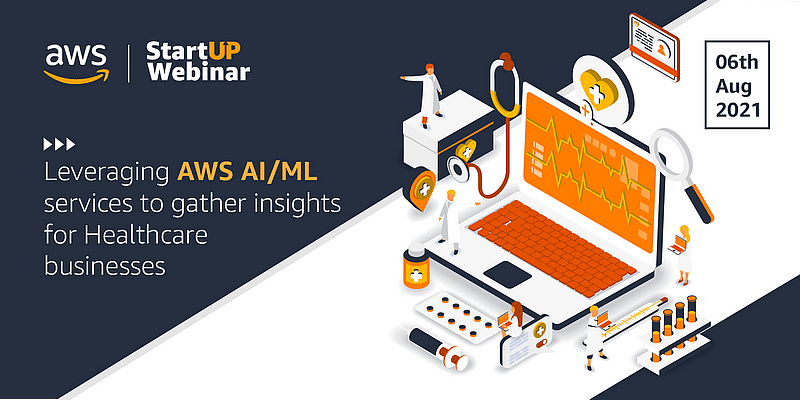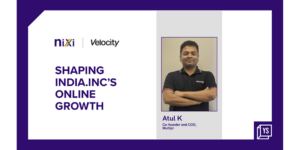Healthcare has become one of India’s largest sectors – in terms of revenue and employment. This industry is growing at a brisk pace, with increased expenditure with public and private players. In the last decade the country has witnessed a digital transformation in healthcare, with huge volumes of structured and unstructured data (from patients and various medical devices). Considering this growth, it has now become imperative that health care entities consider Artificial Intelligence and Machine Learning services to streamline everything from diagnostics, medical documentation analysis, personalised patient experiences and more.
In order to showcase how AI/ML can help extract valuable insights from medical data, YourStory in association with AWS hosted the StartUP webinar series ‘Applying AI and ML to Healthcare data – diving deep into 4 use cases.’ Kousik Rajendran, Solutions Architect and Healthcare Life Sciences Specialist and Arun Kumar Lokanatha AI/ML Specialist Solutions Architect took attendees through a hour and a half session packed with insights and demos.
Healthcare at AWS
Kousik began the session by talking about AWS’ experience in healthcare. For over seven years, AWS has had a team of digital strategists, chief medical offices, researchers, physicians, radiologists and various stakeholders from the healthcare ecosystem working in the healthcare vertical. This team works with different customers, to help them scale and leverage the best from healthcare solutions. AWS focuses on 5 key areas in healthcare:
- Global Infrastructure
- Security and compliance (specifically with HIPAA)
- Advanced analytics and AI/ML
- Healthcare enterprise solutions
- Partner network
Within the Indian healthcare ecosystem, AWS works with startups like 1mg, practo, Innovaccer,cure.fit, MedLife and more.
AI/ML for Healthcare
What drives AI/ML solutions for healthcare? Improving patient outcomes. So, what are the challenges that arise with patient outcomes. There are 3 –
- Consumer interaction – Online and offline patience experiences
- Core workflow – Data processing, high accuracy requirement, complex ML workflows
- Compliance – HIPAA, PHI, HITRUST
Kousik then went on to explain how AI/ML could help combat the three core challenges of healthcare. For consumer interaction, healthcare practitioners can leverage personalised content through user behaviour and sentiment to build intelligence customer engagement. Core workflows could be streamlined through AI-powered diagnostics, which includes use cases like medical document processing, EHR/ EMR data analysis, etc. For security and compliance, fraud detection could help identify user behaviours, user patterns and anomalies in user access through various ML models and services.
Why AWS for ML
In this section, Kousik focuses on why healthcare entities should consider AWS’ AI/ML services, in particular. AWS, he said, allows customers extract meaningful medical information from raw, unstructured data. Secondly, he emphasised that using AWS services can help accelerate innovation. Finally, he spoke about AWS’ capabilities as a transparent, secure and comprehensive cloud platform.
Kousik then took the audience through the three-layer ML stack. The stack and the services it provides handles most of the heavy lifting, leaving customers to work quickly and efficiently. The top section – AI services – allows customers to easily add intelligence to their applications, without requiring Machine Learning skills.
The mid-layer is Amazon SageMaker, which provides developers and data scientists with the ability to build, train and deploy ML models at scale.
The bottom layer – of ML frameworks and infrastructure – cater to those data scientists who want to build from scratch.
Data in healthcare
The need of the hour, Kousik says, is to harness data and store in a way that allows customers to leverage ML efficiently.
“As of now, most of these clinical models are leveraging around 30 data points for building a model, but in future this could scale above 200-300 thousand data points for AI/ML models.”
The most important challenge, then, is to extract and understand these masses of unstructured data – from medical forms, images and audio transcriptions. Services like Amazon Rekognition could help in understanding images like x-rays. Amazon Transcribe can help in extracting entities and automatic speech recognition from recorded calls. Furthermore, he shared how AWS provides generic AI/ML services, and those that are designed for healthcare, such as Amazon HealthLake, Amazon Transcribe Medical and Amazon Comprehend Medical.
Kousik then moved on to a deep dive of AWS services like Textract. In the demo, he demonstrated extraction from a sample diagnostic form. He also spoke of different services such as Rekognition, Textract and Amazon Transcribe Medical.
He also introduced Amazon HealthLake – a new service that was launched recently in the USA. This service enables healthcare providers, insurance companies and pharma companies to store, transform, query and analyse data in the AWS cloud on a petabyte scale.
Demo with Arun Kumar Lokanatha
Kousik then handed the session over to Arun Kumar Lokanatha, AI/ML Specialist Solutions Architect (AISPL) to conduct the demos. He started with a deep dive into the capabilities of Amazon Rekognition.
The first demo was for Medical Image Analysis, using a chest x-ray to detect pneumonia and mask information. The demo covered text in image, identity verification, and examples from UC San Diego Health and Stanford University.
The second deep dive was on the personalisation of consumer experience, through three use cases – recommending doctors through patient search, recommending diet/ food items and product recommendations from health e-commerce platforms through Amazon Personalize.
Demo with Kousik Rajendran
Kousik handled the second demo on building conversational agents. He spoke about conversational care bots like AWS QnABot using Covid-19 as an example.
The final use case Kousik spoke of was extracting insights from medical documents. He referenced the health insurance company Anthem, which used Amazon Textract for intelligent claims processing.
He then wrapped the session by speaking of how AWS can help healthcare entities (especially startups). These include workshops, immersion days, training, certification, AWS ML Jumpstart, AWS credits and the support of AWS Professional Services and Partner Network.










